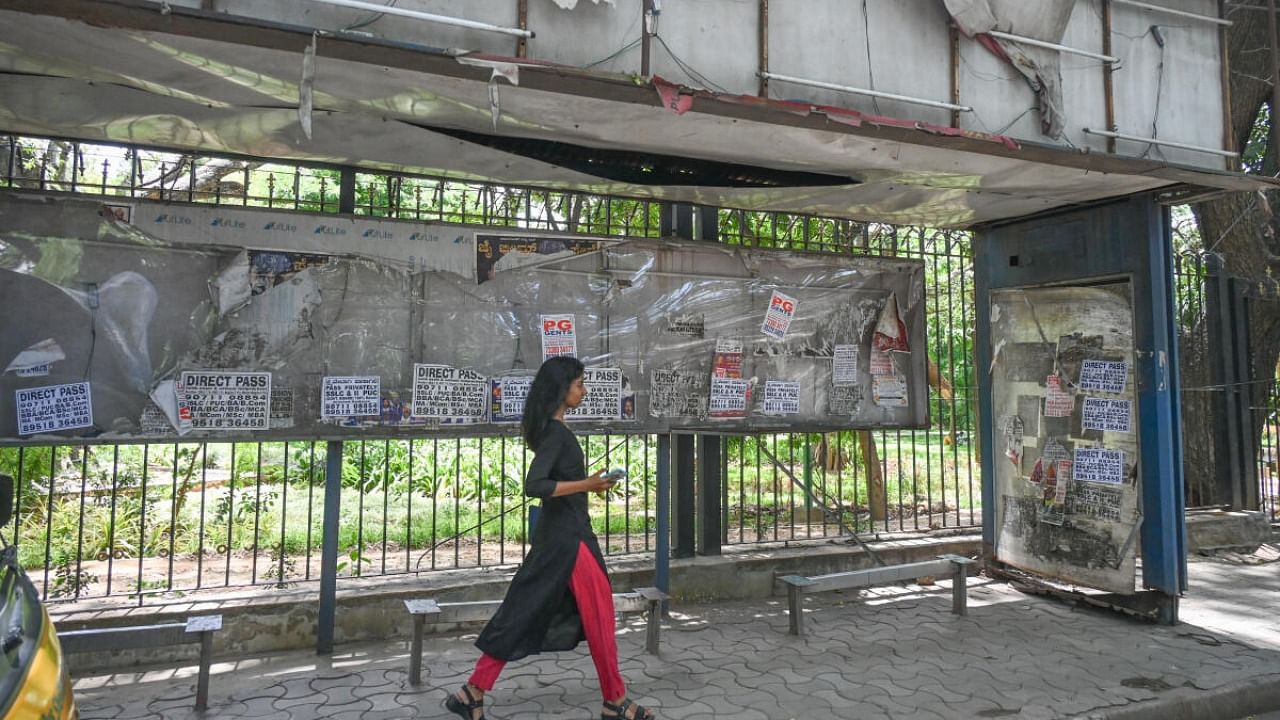
As the curtains rise on the much-anticipated free bus travel scheme for women, one of the key promises in the Congress party's poll manifesto, a crucial question arises: Are the bus stops and bus shelters in Bengaluru adequately equipped to handle the imminent surge in passenger numbers?
As the dreams of countless women in Bengaluru are on the verge of being fulfilled, concerns arise over the preparedness of the city’s 1,500 bus shelters, many of which operate under the dynamic public-private partnership (PPP) model.
A reality check conducted by DH at various facilities revealed that fundamental needs were being neglected.
Amidst the chorus of commuters, some concerns stood out: insufficient lighting, poor hygiene and safety worries.
Veena, a garment factory worker in Kadubeesanahalli, expressed her unease about the poorly lit bus stop she frequented. Likewise, Shruti Joshi, a student, highlighted the issue of inadequate lighting at a bus shelter in BTM Layout, underscoring the need for the state government to prioritise the safety of women commuters and ensure the provision of proper infrastructure.
“The state government should take up women commuters’ safety as a priority and ensure basic infrastructure," she said.
Daily-wage workers Sharmila Kumari and Shivraj encountered the arduous challenge of insufficient lighting and uncomfortable seating while waiting at a bus shelter near Sri Raghavendra Swamy Temple. Similarly, at Bellandur Gate on Sarjapur Road, Rajendra, a teacher, highlighted the lack of a proper structure at the bus stop, leaving commuters vulnerable to the whims of the elements.
Echoing these sentiments, Sneha R, a student, expressed concerns about standing alongside bustling traffic, underscoring the significance of enhanced bus shelters over free tickets.
“It's a gamble we are forced to take. I would request the government to provide us proper bus shelters rather than free tickets,” she said.
In the bus shelter near Wilson Garden Police Station, Ramesh G, a senior citizen, expressed his disheartenment at witnessing the gradual decay of a once vital public space.
While at Kadubeesanahalli, Kunal Sharma, an IT professional, experienced the elements firsthand as the insufficient roof of a bus shelter left him exposed, Nivedita, a techie, brought attention to the perilous web of wires in front of a bus stop, posing a serious safety threat.
Jaideep Talwar, a student, expressed his profound dissatisfaction with the lack of attention from officials, resulting in the bus shelter near RV Dental College being maintained in an unhygienic state. Highlighting the need for a shift in government priorities, he emphasised that addressing the essential needs of commuters should take precedence over the implementation of the free-travel program.
Dhanyashree K, an IT professional, drew attention to the deteriorated condition of a bus shelter on Sri Kengal Hanumanthaiah Road, Shanti Nagar, citing broken floors and an overall unhygienic state. She emphasised the urgency of addressing these issues before the implementation of free bus travel.
In a similar vein, Tanvi, a student, characterised the dilapidated bus stop as a poignant symbol of neglect and abandonment. Her perspective shed light on the need for revitalisation and proper maintenance of these essential public spaces.
BBMP's Concessionaire Charges
According to a senior official from BBMP, all bus shelters operate under a PPP model.
"We have not invested any money. However, one issue that we have raised with Bescom is that private parties, who are agreeing to pay Bescom and electricity charges, should be allowed power connections. Bescom is still working that out. We have also asked private parties to approach Bescom for electricity connections for these bus stands. They seek electricity connections to illuminate their advertisements during the night. It is a win-win situation for both citizens and private parties. Now, Bescom has to take a call on that. The bus stands should be lit in another 10 or 15 days," the official told DH.
Expanding on the advantages of the PPP model for BBMP, the official explained, "The BBMP has benefited from the concessionaire charges, which amount to around Rs 45,000 to 50,000 annually. This generates an annual revenue of approximately Rs 6 crore for the BBMP. The concessionaires are responsible for maintaining the bus shelters, and advertising companies select them only if they are well-maintained. However, if some shelters are in poor condition, I will instruct our officials to address the issue promptly. We will upgrade them with better facilities," he added.
Rethinking Bus Shelter Design
It is time to reconsider the design of bus shelters, according to Shaheen Shasa, a member of Bengaluru Bus Prayanikara Vedike (BBPV).
Shaheen points out that most bus stops in the city lack bus shelters, making it challenging to identify them. Commuters have to rely on cues like where people are waiting or where buses stop to locate the bus stops. Moreover, the existing bus shelters often have uneven floors, increasing the risk of accidents. Inadequate information about travel routes and destinations further complicates the commuting experience. Shaheen emphasises the need to prioritize the design of bus shelters to ensure they offer proper protection, amenities, and clear information for commuters.